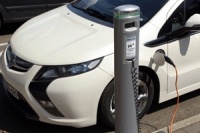Pulling away in Vauxhall’s new extended-range electric car was pretty terrifying. Nothing to do with the car’s design, but because I was in control of a €1m, hand-crafted, one-of-a-kind prototype.
And things were made worse by the fact my passenger was the managing director of Britain’s largest producer of electric car charging stations. As I gripped the steering wheel, it felt like the future of the UK’s electric vehicle industry was almost literally in my hands.

But once I relaxed and got used to the engine’s high-pitched whirr, I almost forgot I was in an electric car.
The Ampera is designed not as a commuter runabout but as a primary family car, and it’s not hard to see it filling that role, thus conquering consumer fears of being stranded on a motorway after running out of juice. It’s basically an Astra with a massive battery underneath and a petrol-fuelled generator that kicks in after 40 miles for those long weekend journeys.
Having never driven an electric car before, I was unsure what to expect. It took some time to get used to the controls: the brakes weren’t as responsive as I’d have liked and, even with the automatic gearbox, the drive through town could have been smoother.
Speeding along the country roads through the Chilterns was a different story. Instead of slowing things down, the car’s substantial weight added to the feeling that this was a powerful vehicle that really could rival traditional models, and acceleration was never a problem – even on the motorway.

Of course, even with a top speed of 100mph, it won’t convince all the committed petrolheads out there. And the sound of a tiny jet engine that emerged from under the bonnet was surprisingly loud and echoed around the car unnervingly when you’re in the passenger seat.
But with the practical issues of size, range and much lower emissions covered, it felt like a huge step forward.
Production is due to begin in 18 months and Vauxhall is planning a below-cost sale price of £30,000, so don’t be surprised to see the Ampera lining suburban driveways of the UK within a few years’ time.
The Ampera can be driven 40 miles on battery power alone, after which a petrol-driven generator provides a further range of 310 miles. An estimated 80 per cent of people in the EU have a commute of less than 30 miles.
It provides 111kW of power, 370Nm of torque, has a top speed of 100mph and can go from 0 to 60mph in around nine seconds.
Unlike a hybrid, the battery isn’t topped up when driving, but it can be charged in three hours using a typical 230v socket. The lithium ion battery holds 16kWh of energy, of which 8kWh are usable, and has a 10-year or 150,000 mile warranty.
Under the European test cycle, Vauxhall estimates the car can do 175mpg and produces less than 40g per km of CO2 through the petrol engine.
Vauxhall has yet to decide where to manufacture the car, but because the UK is seen as the biggest potential market for electric vehicles, and the design is so similar to the Astra, it could be built on a flexible production line at the company’s factory at Ellesmere Port in Merseyside.
It is expected to cost £30,000 to buy, which could be brought down to £25,000 on the road if the current government subsidy of £5,000 is kept in place.
The prototype Ampera recently completed a 175 mile-long single trip (without recharging or refuelling) from Luton to Ellesmere Port. Vauxhall claims that this is the longest single trip completed by an electric car on British roads. However, Racing Green Endurance, an all-electric supercar developed at Imperial College, recently completed two full circuits of the M25 (around 230 miles) on a single charge.





April 1886: the Brunkebergs tunnel
First ever example of a ground source heat pump?